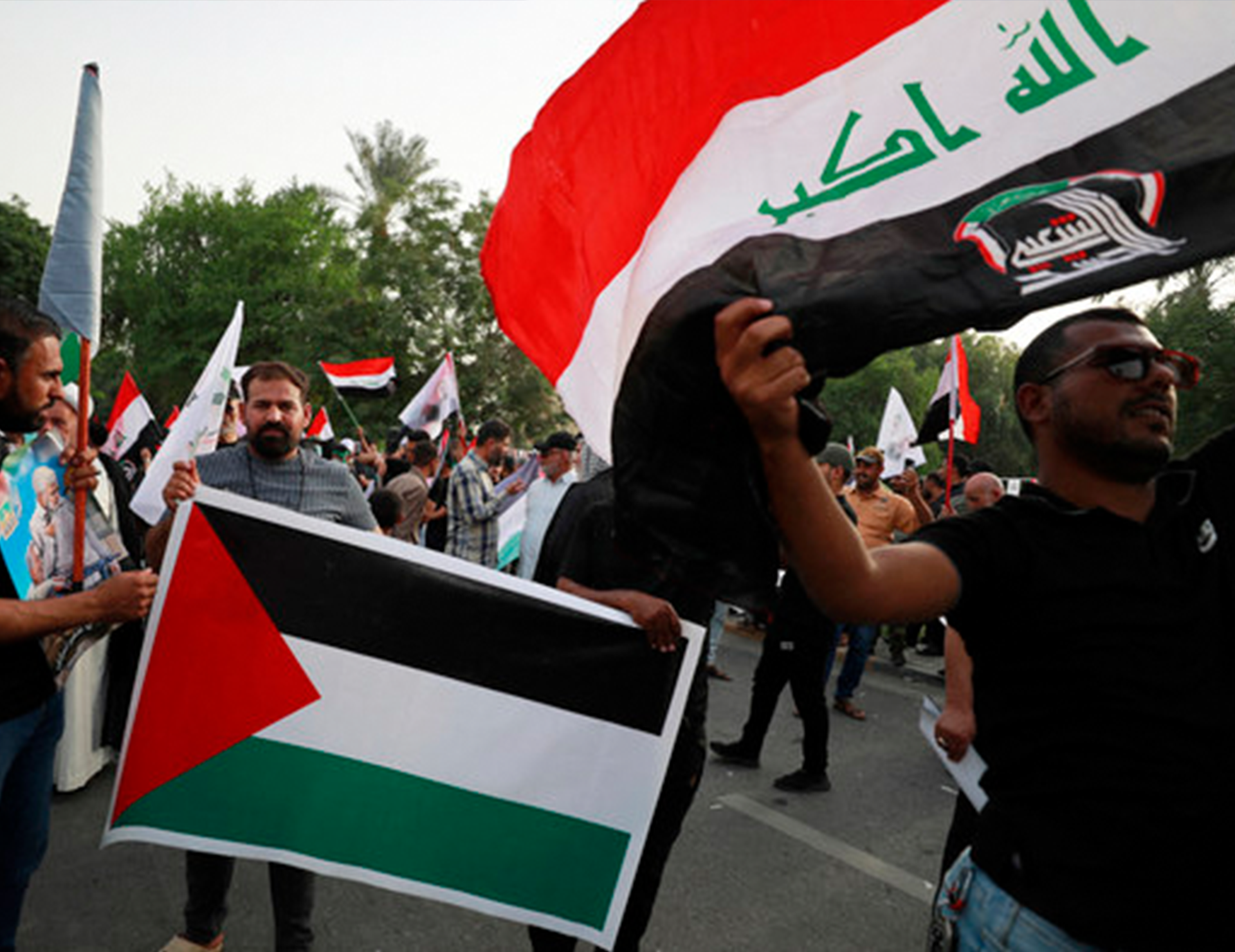Hamas pivot towards Iraq signals involvement from Iran's ally

Iraqis carry placards and wave the Palestinian flag during a protest in Baghdad, October 20, 2023, to express their support of the Palestinian people amid the ongoing battles between Israel and Palestinian groups. (AFP)
As headlines rage over an inevitable war between the Israeli Defense Forces and Hezbollah, the Iran-backed militant group in Southern Lebanon, Hamas is using this time out of the spotlight to regroup, realign, and reposition. Eyes on the Israel-Hamas War are quickly shifting toward the north as Prime Minister Benjamin Netanyahu orders a reduction of fighting against Hamas in the likelihood of a full frontal assault in the north. However, the tensions between Israel and Iran’s Lebanese assets overshadow the slow but unprecedented realignment between Sunni Hamas and Iran’s other majority-Shia ally, Iraq.
Reports from several news outlets suggest Hamas leadership is looking to move its offices and personnel from Qatar to Iraq due to “increasing pressure from both Doha and the United States” to show flexibility in negotiations with Israel to broker a ceasefire deal. Hamas leadership denies these claims stating “There is no truth in the reports suggesting Hamas is planning to leave,” such that the advisor to the PM of Iraq reaffirmed that “Hamas offices will not be opened in Baghdad as the media reports claimed.” These statements abrogate previous reports of the Iraqi government approving a move in May, after Hamas leadership, a senior Iraqi MP, and the Iranian FM Ali Bagheri met to discuss the opening of a Hamas “media and public relations” office in Iraq. Whether Hamas leadership moves with or denies this plan, it is undeniable that Iraq is assuming an important role in the greater proxy war between Israel and Iran.
Baghdad’s reaction to the Israel-Hamas War reflects stronger ties with Tehran
Since the October 7th attacks, the streets of Baghdad have been a hotbed of anti-American and anti-Israel protests, most notably the “million-man” protests in Baghdad’s Tahrir Square during Israel’s initial retaliation in November 2023. Many of the protesters were supported by Iraq’s influential Shiite figure Muqtada al-Sadr, a leader of the pro-Iran Sadr Movement which now holds 10 percent of the seats in Iraq’s Council of Representatives. After al-Sadr's initial boycott and nearly three years of mass protests against the elections from 2019 to 2021, his party’s victory reasserted Iranian influence over Iraqi foreign policy thereby closing the gap between Israel and Iran’s Shia Crescent Grand Strategy.
Similar outbursts against the West continued into early June when a dozen masked men were seen storming, smashing, and violently raiding American-brand restaurants such as KFC, Lee’s Famous Recipe Chicken, and Chili House in the Iraqi capital. The vandals were met by security forces hours after the attacks. These attacks were also orchestrated by supporters of the Iran-backed militias in Iraq, but what cannot be overemphasized is that these attacks are not simply exertions of Iranian influence over neighboring Iraq. Rather they reflect “surging anger against the United States, Israel’s top ally, over the war in Gaza.” The message was made clear: “No to agents,” “no to Israel,” and no to American influence even if that means upsetting relations with Washington.
Whereas previous Iraqi parliaments tried to balance their relations with Tehran and Washington, the Israel-Hamas War and the return of the al-Sadr signal a simultaneous reformation from both the clerical, government elite, and the Iraqi people themselves toward an Iran-facing outlook.
Is Iraq a “playground” or is the government simply in recess?
Experts characterize post-2003 Iraq as a “playground” for American and Iranian interests, where dependence on Western investment and deference to Iranian-backed militias leaves Iraq with very little sovereignty. Iraqi Prime Minister Mohammed Shia al-Sudani, who came to power with the backing of a pro-Iran coalition, is trying to reassert Iraq’s sovereignty by emphasizing that Iraq is simply “out of war,” that is, reestablishing its relationship with Washington and Tehran without military considerations, despite the Israel-Hamas war greatly affecting Iraq’s policies. In reality, the Iraqi government is more so in recess than actually mitigating sovereignty.
Although in recent months Baghdad continues to cooperate with the US to reduce and protect soldiers stationed in the US, the government has essentially allowed its policies to be at the whim of Iran-backed militia groups which seek to deter US interests completely. Leaders of the Iran-backed militias such as Kataib Hezbollah and Harakat al-Nujaba openly advocated for the violent demonstrations in Baghdad, but the Iraqi government did not respond with condemnation or consequences, rather, the involvement of security forces only after the fact. Furthermore, when US Ambassador to Iraq Alina Romanowski condemned the targeting of US-based businesses on the social media platform X (formerly Twitter), the Iraqi government did not respond with condolences or concern fearing backlash from the militia groups and further street-wide protests.
Baghdad’s policies of de-escalation are not proactive against the militias’ intimidation tactics which interfere in domestic politics. The government continues to be reactive, where deploying security forces is only a means of appeasing Washington and showing faux stability.
Implications for Hamas and Iraq
Competing reports over Hamas leadership’s move to Iraq leave much to be seen for both Hamas’ branding and Iraq’s people. Domestically, allowing Hamas to reside in Baghdad would be received very positively by most Shi’i Iraqi citizens given — since the time of the 1948 Arab-Israeli War — Iraq continues to be one of the staunchest anti-Israel states in the Arab World, evidenced by the 2022 law making “normalizing” ties with Israel a criminal offense punishable with a death sentence or life imprisonment.
The Kurdish Region as well as some Sunni groups fear hosting Hamas leadership in Baghdad will “deepen differences with the United States,” a state they continue to cooperate with given training and military support of their respective forces. Already, US Spokesperson Matthew Miller commented on the report of an alleged Hamas move to Baghdad stating that to “every government in the region there should be no more business as usual with Hamas after the horrific attacks of October 7th.”
The lack of consensus among the different ethnic groups, insecurity from the militia groups, and a feeble government will ultimately create a great environment for Hamas to stay in Baghdad in the long run. Hamas and backlash from the West should be the least of Iraq’s worries, especially as Iraq has so swiftly chosen Tehran for support. Moreover, Iraq would be the perfect peace broker for Hamas as Iraq’s unequivocal, undeniable hatred of Israel and sorry relations with the US would leave Hamas in the clear of a ceasefire deal. Qatar, in comparison, is a Western ally and a highly centralized kingdom that could easily remove Hamas leadership from the country if deemed necessary.
Hamas has realigned and repositioned itself under the Iranian camp. The leadership does not have to be under the domain of the mollahs in Baghdad for experts to necessarily see how closely Hamas is working with Iran, not simply shirking its Muslim Brotherhood roots, but harmonizing their platforms for the purposes of attacking the Jewish State. The most one can say is Hamas is de facto an Iranian-backed militia group, certainly not to the extent Hezbollah, but a militant group that has decided to become a part of Iran’s arsenal. What is to be taken from this “move” is that the Iranian regime is streamlining its area of attack from Tehran all the way to Tel Aviv via its militias and proxies, clearly using Iraq as a foil.







